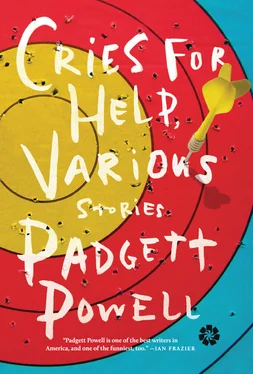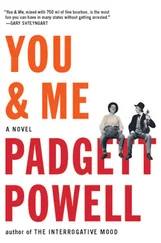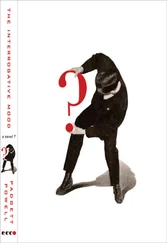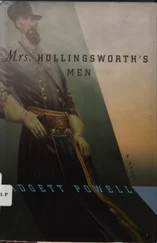“Yeahnow,” the bum says, “I clickin’ and clackin’ down the track now .”
No Empress Eyes In Here had first been named No Empress, then No Empress Eyes, and then the owner’s daughter, hearing the name but not knowing it applied to a horse, said, “No empress eyes in here ,” and the final name was set. She was ten years old, the daughter, and lived in New Jersey. They then told the daughter that the horse No Empress Eyes In Here disappeared during the Kentucky Derby when she fell through a trapdoor in the track. She went down a laundry chute not to China but to some other inscrutable place no one knew anything about or where it was, so “She might as well,” the daughter said, “have gone to China,” for all they could do about it. Thereafter the horse was known as No Empress Eyes Down There.
There was a boy in Kansas, also ten, who dreamed of inventing a new kind of combine that would not harm animals when it came upon them in the wheat. Specifically the boy was thinking about fawns, who were told by their mothers, who had galloped away, to stay put no matter what, and who, the fawns, would stay put no matter what, no matter if a combine with a 24-foot-wide worm blade came upon them and scooped them up and sprayed them into the wheat in pieces no larger than the wheat. This very much bothered the boy, who wanted to be a farmer badly except for this one thing, turning baby deer into bloody wheat. So he wanted a humane combine. He thought and thought and could not come up with an idea for a combine that would pick up the deer and set it to the side and pet it and send it trotting off to the place its mother had hightailed it to before abandoning it in the field with the diesel monster bearing down on it. He wanted the mother deer to be issued a citation for negligent parenting too, and maybe have the combine call the department of child welfare and take the fawn away from the mother as it did children from human parents who did things not nearly as bad as leave their children in the tall grass in front of huge machines. But he would never invent a machine that would do all this, that was fantasy thinking, he wanted a real machine to really rescue the fawns, forget about justice. He thought and thought and finally arrived at a compromise suggested by the man at the Brandt’s meat market in Lucas: the fawn could be scooped up and blown whole into another chamber, probably dead, but not in a million pieces. Okay, the boy said, okay. Until he could invent the new combine he drove the conventional combine so slowly that everyone was unpleased with him during harvest but he did not care. He was through with scooping up fawns. He was disgusted with these people, like John Deere, who probably called themselves that for a joke, and a joke about killing deer was not funny. They had a slogan “Runs like a Deere” that ought to be “Like Running Down a Deere,” he thought.
After the horse she’d named fell through the track and no one did anything about it, the horse owner’s daughter felt she’d had it with these people and ran away. It went well for a while, was not too frightening when she was on the bus, but then she was walking a long way and in the country and she hid in a field, and a giant machine came up on her with a big steel like barber-pole thing turning and cutting the grass, and it stopped, the machine, coming at her, but the barber pole did not stop turning and hissing, and a boy got out of the glass cabin on top of the machine letting blaring music come out with him, like Queen, or Aerosmith, and she wondered what kind of hicks they had out here wherever she was. “Well,” the boy said, “do you want to run like a deer or be run down like a deer?” That was about the coolest thing she had ever heard anyone say whether he was a hick or not, and she got in the cabin and they mowed some more field.
Then they went to his cave. It was in the side of a creek bank with no water in the creek and it was filled with a lot of appliances that did not work because there was no power. He had floor lamps in it with fringe on the shades, and a big kitchen stove, and an old TV with a wood cabinet that looked like an aquarium full of dull green algae and no fish, and a brass bed that was brown from the moisture in the cave. There were no bats. The boy said he wanted bats but none ever came in that he saw. There were only dried-up roots hanging from the ceiling. These felt like bats when you touched them. If it were her cave she would trim the ceiling, the horse owner’s daughter thought.
They decided they had to tell someone where she was but the boy was afraid he would be arrested for kidnapping and molesting her. “All you did was run me down like a deer,” the girl said, suddenly wondering what became of the jockey on her horse that had gone down the hole in the track. Really, nothing had been said at all about the jockey; it was a thoroughly unsatisfying business, that horse disappearing, and horse racing in general, and rich people, and poor people, the whole earth was messed up, and now here was a boy talking about molesting her who had not touched her, who had no idea what molesting even meant. She didn’t either. “Why don’t you molest me then?” she said.
“Good idea, since I will be ar rest ed for it.” The boy threw himself on the moldy bed. “I don’t know what molest means, actually.”
“I don’t either. Whatever it is, don’t do it.”
“Okay. I won’t.” The boy had crossed his feet and put his hands behind his head. “ Man ,” he said, “this is like living !”
They both envisioned living in the cave for a good long time away from horrible and boring horse racing and horrible and boring farming—“But farming is not boring, just horrible, and just the fawn grinding,” the boy said — but they knew they couldn’t make it very long in a cave. “That is fan tasy thinking,” the boy said.
“No Empress Eyes Down Here,” the girl said, and the boy did not ask what in the world was she talking about. He just got out of bed and adjusted his pliers on his belt and said, “Come on.” He was very cool, in her judgment. They held hands crossing the field.
“I think holding hands is part of molesting,” the girl said.
“Okay,” the boy said. “I will be ar rest ed.” He clearly enjoyed saying arrested .
At the farm the boy’s father called the Sheriff and reported having the girl with no more travail than he might have reported the wheat to be too wet to harvest, and his mother set a place at the table almost as if they had expected her and certainly as if she were a guest they were pleased to have and not a runaway with legal strings attached to her. If anyone was going to be arrested it was not going to be them, or even her, it seemed. The mother told her everything would be fine and she could plan to stay with them until they heard anything from the Sheriff.
“We want to live a long time together in the cave,” the boy said.
“We’ll have to run some Romex out there after dinner,” the boy’s father said, “in that case.” He was eating and perhaps joking, perhaps not, you could not get a good look at his mouth for the food going in. He had on his belt the same kind of pliers the boy had on his. He wore jeans and non-pointy boots and no hat. These Kansas people were not like Texas people. The girl had had enough of Texas people with their ridiculous boots and jewelry, always around scaring the horses and trying to buy everything in sight. She had not seen a Kansas person try to buy anything and she had not heard one be loud. This was more like it. If they were going to run Romex to the cave, whatever that meant, she would help them.
Читать дальше












